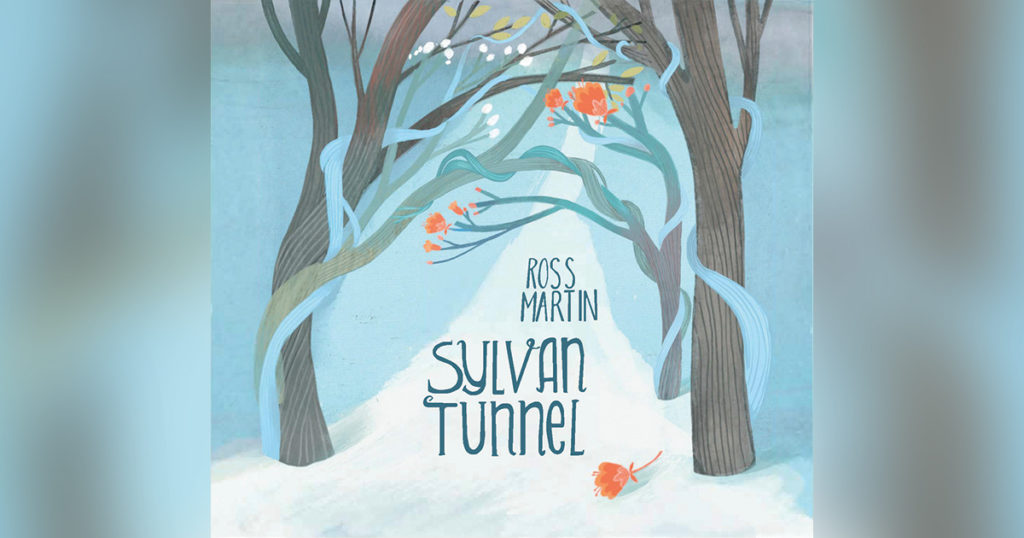Sylvan Tunnel
Like Tony Rice and David Grisman before him, guitarist Ross Martin fords across genres, treading the borders of jazz and bluegrass. A longtime member of the Matt Flinner trio, and regular duet partner of Grant Gordy, Martin is equally at home picking on a fiddle tune, navigating the tight corners of a Bud Powell composition or setting the tone with an understated intro to one of his originals.
On Max Johnson’s Big Eyed Rabbit, Martin showcased the ease with which he can weave strains of free jazz into traditional folk melodies and slick Nashville licks. On his new album, Sylvan Tunnel, Martin goes further afield, doing away with distinctions almost entirely. He plays telecaster on nearly every song alongside Darol Anger on the fiddle and Marc Dalio on the drums, creating an atypical texture. Martin’s crunchy twang is buoyed by saxophonist Dominic Lalli and ballasted by the firm, woody tone of bassist Greg Garrison. The songs lean earthly and pastoral, with singable melodies and long stretches of free-ranging improvisation. Dynamics rise and fall as the soloists come in and out of the frame.
The opener, “Flight of the Green Chair,” soars out of the gate with two powerhouse solos and a soft breakdown from Martin. The song’s structure reflects much of the writing on the album, as pieces flow from section to section with ease, marking gradual shifts in the mood of each. “Moment of Invisibility” takes on a softer hue. Here, Martin is joined by late cornetist Ron Miles whose painterly blue notes compliment Martin’s plaintive, warm tone on the melody. Miles takes an airily lyrical solo and returns for the song’s twisty interlude. Martin’s own solo develops organically through the thoughtful tending of melodic seeds. Throughout, he echoes the spacious quality of guitarist Bill Frisell, another adept genre hopper and frequent Miles’ collaborator. The title track, “Sylvan Hollow,” begins at a regal pace, the horns playing padded harmonies as the drums move lightly. Again, Martin makes use of empty space, giving his phrases room to grow. The ending melody, orchestrated between the guitar, fiddle and horns, is stately and chorale-like, lush in its fullness.
“No Light from Beckett’s Hollow” has a slightly sinister bend, with Martin’s suspenseful intro sounding like the title credits of a gritty western. Cornet, fiddle and guitar trade melodic duties as the tune unfolds mysteriously. Martin ends with a knotted outro, rending the surface of the song with fuzzed-out distortion as the other instruments loop a groove. “Hard Times on Elk River” adopts the modal sound of jazz standards like “Maiden Voyage.” Featuring mandolin from Flinner, the song builds naturally, as wide chord progressions give the solos the chance to build intensity, going from elusive to intricate to smoking. “The Ruined Roux,” bounces along with a playful strut, somewhere between a New Orleans skip beat and a blues shuffle. The reprise of “Sylvan Tunnel,” features Martin on acoustic guitar joined by Flinner, as they run through a gentler take of the melody, giving the feeling of a homecoming as the drums roll softly with brushes and mallets.
The album is an ambitious, adventurous outing, filled with rich songwriting that never settles into genre expectations. Recalling the sound of Miles’ I Am a Man, Frisell’s This Land and Gary Burton’s Tennessee Firebird, Sylvan Tunnel comfortably adds Martin to the ranks of these crossover luminaries. With this record, Martin proves himself not only to be an adept composer and guitarist, but an artist with a sweeping vision of Americana, steeped heavily in dual musical traditions.

